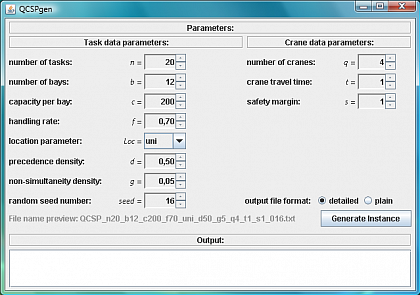QCSPgen - A Benchmark Generator for Quay Crane Scheduling Problems
This page provides QCSPgen - a software for generating benchmark instances for the quay crane scheduling problem. Scheduling quay cranes at container terminals is a field of growing interest in research and practice. A number of related journal publications is listed at the end of this page. So far, there exists no benchmark platform that allows comparing different models and solution procedures. This gap is closed by QCSPgen.
The generation scheme is described in detail in the paper "A unified approach for the evaluation of quay crane scheduling models and algorithms" (Computers & Operations Research 38, p. 683-693, 2011). link to paper
For more information contact frank.meisel@wiwi.uni-halle.de
Download current version:
QCSPgen.jar
(75.6 KB) vom 16.05.2010
Computational results for the benchmark sets.
QCSP_benchmarks.pdf
(41.6 KB) vom 23.05.2010
Description of plain file format provided by QCSPgen.
Description_of_plain_file_format.pdf
(21 KB) vom 16.05.2010
QCSPgen is a Java application that can be run on any operating system with a Java Runtime Environment (JRE) installed. A JRE can be downloaded here . QCSPgen can then be started from the operating system directly (e.g. by double clicking the file in the Windows Explorer on Microsoft Windows operating systems) or from the command line command "java -jar QCSPgen.jar". Further explanation on how to run jar-files is provided here .

The graphical user interface of QCSPgen.
QCSPgen uses the random number generator of the uncommons-maths library. This library is already included in the file QCSPgen.jar.
A selection of journal publications on the quay crane scheduling problem:
- C. Bierwirth, F. Meisel, A survey of berth allocation and quay crane scheduling problems in container terminals, European Journal of Operational Research 202 (3) (2010) 615–627.
- C. Bierwirth, F. Meisel, A fast heuristic for quay crane scheduling with interference constraints, Journal of Scheduling 12 (4) (2009) 345–360.
- C. F. Daganzo, The crane scheduling problem, Transportation Research Part B 23 (3) (1989) 159–175.
- K. H. Kim, Y.M. Park, A crane scheduling method for port container terminals, European Journal of Operational Research 156 (3) (2004) 752–768.
- D.-H. Lee, H. Q. Wang, L. Miao, Quay crane scheduling with non-interference constraints in port container terminals, Transportation Research Part E 44 (1) (2008) 124 – 135.
- A. Lim, B. Rodrigues, F. Xiao, Y. Zhu, Crane scheduling with spatial constraints, Naval Research Logistics 51 (3) (2004) 386–406.
- A. Lim, B. Rodrigues, Z. Xu, A m-parallel crane scheduling problem with a non-crossing constraint, Naval Research Logistics 54 (2) (2007) 115–127.
- J. Liu, Y.-W. Wan, L. Wang, Quay crane scheduling at container terminals to minimize the maximum relative tardiness of vessel departures, Naval Research Logistics 53 (1) (2006) 60–74.
- L. Moccia, J.-F. Cordeau, M. Gaudioso, G. Laporte, A branch-and-cut algorithm for the quay crane scheduling problem in a container terminal, Naval Research Logistics 53 (1) (2006) 45–59.
- R. I. Peterkofsky, C. F. Daganzo, A branch and bound solution method for the crane scheduling problem, Transportation Research Part B 24 (3) (1990) 159–172.
- M. Sammarra, J.-F. Cordeau, G. Laporte, M. F. Monaco, A tabu search heuristic for the quay crane scheduling problem, Journal of Scheduling 10 (4-5) (2007) 327–336.
- Y. Zhu, A. Lim, Crane scheduling with non-crossing constraint, Journal of the Operational Research Society 57 (12) (2006) 1464–1471.
